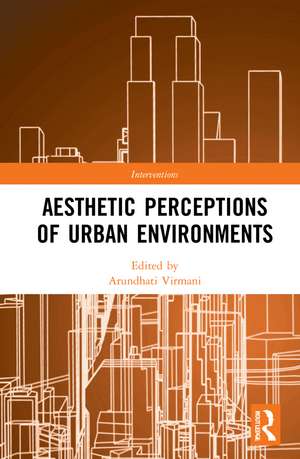Aesthetic Perceptions of Urban Environments: Interventions
Editat de Arundhati Virmanien Limba Engleză Paperback – 31 mai 2023
Three axes are privileged. The first considers urban everyday aesthetic experiences in the long-term as a historical production, from medieval Italy to a future imagined by science fiction. The second examines the impact of aestheticizing everyday material realities in neighbourhoods, and the tensions and conflicts these engender around urban commons. Finally, the third axis considers these relationships as aesthetic inequalities, exacerbated in a new age of urban development. The book combines local and transnational scales with an interdisciplinary approach, bringing together historians, sociologists, cultural geographers, anthropologists, architects and contemporary art curators. They illustrate the importance of combining different social science methods and functional perspectives to study such complex social and cultural realities as cities.
This book will be of interest to students, scholars and practitioners of humanities and social sciences, cultural and urban studies, architecture and political geography.
| Toate formatele și edițiile | Preț | Express |
|---|---|---|
| Paperback (1) | 386.57 lei 6-8 săpt. | |
| Taylor & Francis – 31 mai 2023 | 386.57 lei 6-8 săpt. | |
| Hardback (1) | 1002.50 lei 6-8 săpt. | |
| Taylor & Francis – 28 oct 2021 | 1002.50 lei 6-8 săpt. |
Din seria Interventions
-
 Preț: 297.79 lei
Preț: 297.79 lei -
 Preț: 310.65 lei
Preț: 310.65 lei -
 Preț: 309.41 lei
Preț: 309.41 lei -
 Preț: 319.01 lei
Preț: 319.01 lei -
 Preț: 327.40 lei
Preț: 327.40 lei -
 Preț: 156.44 lei
Preț: 156.44 lei -
 Preț: 128.80 lei
Preț: 128.80 lei - 9%
 Preț: 1041.01 lei
Preț: 1041.01 lei -
 Preț: 112.30 lei
Preț: 112.30 lei -
 Preț: 123.84 lei
Preț: 123.84 lei -
 Preț: 302.17 lei
Preț: 302.17 lei -
 Preț: 286.66 lei
Preț: 286.66 lei -
 Preț: 309.65 lei
Preț: 309.65 lei -
 Preț: 111.26 lei
Preț: 111.26 lei -
 Preț: 312.36 lei
Preț: 312.36 lei -
 Preț: 309.70 lei
Preț: 309.70 lei -
 Preț: 311.48 lei
Preț: 311.48 lei -
 Preț: 379.30 lei
Preț: 379.30 lei -
 Preț: 279.25 lei
Preț: 279.25 lei -
 Preț: 189.29 lei
Preț: 189.29 lei -
 Preț: 303.01 lei
Preț: 303.01 lei -
 Preț: 342.07 lei
Preț: 342.07 lei -
 Preț: 443.86 lei
Preț: 443.86 lei - 18%
 Preț: 1055.06 lei
Preț: 1055.06 lei - 18%
 Preț: 999.51 lei
Preț: 999.51 lei - 25%
 Preț: 880.72 lei
Preț: 880.72 lei - 18%
 Preț: 1057.05 lei
Preț: 1057.05 lei - 18%
 Preț: 1001.90 lei
Preț: 1001.90 lei -
 Preț: 411.42 lei
Preț: 411.42 lei - 18%
 Preț: 1005.04 lei
Preț: 1005.04 lei - 18%
 Preț: 703.61 lei
Preț: 703.61 lei - 18%
 Preț: 1108.73 lei
Preț: 1108.73 lei - 18%
 Preț: 699.96 lei
Preț: 699.96 lei - 18%
 Preț: 1005.04 lei
Preț: 1005.04 lei -
 Preț: 409.69 lei
Preț: 409.69 lei - 18%
 Preț: 1055.32 lei
Preț: 1055.32 lei - 18%
 Preț: 1109.99 lei
Preț: 1109.99 lei - 18%
 Preț: 1056.00 lei
Preț: 1056.00 lei -
 Preț: 393.86 lei
Preț: 393.86 lei - 18%
 Preț: 1113.95 lei
Preț: 1113.95 lei - 18%
 Preț: 1111.72 lei
Preț: 1111.72 lei - 18%
 Preț: 1053.79 lei
Preț: 1053.79 lei -
 Preț: 393.93 lei
Preț: 393.93 lei - 18%
 Preț: 1059.48 lei
Preț: 1059.48 lei - 26%
 Preț: 822.36 lei
Preț: 822.36 lei -
 Preț: 416.26 lei
Preț: 416.26 lei - 18%
 Preț: 1282.19 lei
Preț: 1282.19 lei
Preț: 386.57 lei
Nou
Puncte Express: 580
Preț estimativ în valută:
73.98€ • 76.95$ • 61.07£
73.98€ • 76.95$ • 61.07£
Carte tipărită la comandă
Livrare economică 14-28 aprilie
Preluare comenzi: 021 569.72.76
Specificații
ISBN-13: 9781032060651
ISBN-10: 1032060654
Pagini: 240
Ilustrații: 34 Halftones, black and white; 34 Illustrations, black and white
Dimensiuni: 156 x 234 x 13 mm
Greutate: 0.38 kg
Ediția:1
Editura: Taylor & Francis
Colecția Routledge
Seria Interventions
Locul publicării:Oxford, United Kingdom
ISBN-10: 1032060654
Pagini: 240
Ilustrații: 34 Halftones, black and white; 34 Illustrations, black and white
Dimensiuni: 156 x 234 x 13 mm
Greutate: 0.38 kg
Ediția:1
Editura: Taylor & Francis
Colecția Routledge
Seria Interventions
Locul publicării:Oxford, United Kingdom
Public țintă
Postgraduate and UndergraduateNotă biografică
Arundhati Virmani (EHESS, Marseilles, France) is a specialist in colonial and contemporary Indian history.
Cuprins
Introduction Part I Aesthetic perceptions of urban environments: A long-term perspective Chapter 1. Pulchritudo civitatis: Aesthetic gazes on cities in communal Italy (12th-14th century) Chapter 2. London, Paris, Rome…: Travellers’ experiences of early modern European cities Chapter 3. Cities destroyed, cities rebuilt: sightseeing after a cataclysm (London, 1666; Lisbon, 1755) Chapter 4. The vertical city in science fiction. Urban utopia or social nightmare? Part II Urban everyday aesthetics as a common good Chapter 5. Whose river is it anyway?: River as commons, river as neighbour – The Yamuna in Delhi Chapter 6. Negotiating advertising aesthetics in early twentieth-century Shanghai Chapter 7. A plea for do(ing) the right thing. An ordinary dog day in Bed-Stuy Chapter 8. Experiencing the urban through the prism of fiction and cinema in postcolonial India Part III Aesthetic inequalities, a challenge for urban grammar Chapter 9. From aesthetic assets to sensitive public policies: for an ethic of the affective city Chapter 10. Battling aesthetic inequalities in contemporary cities: afterthoughts of an Indian architect Chapter 11. The aesthetics of slum? Exploring the lived and the imagined narratives of Dharavi (Mumbai) Chapter 12. Changing the metropolitan face in India. Interview with Giulia Ambrogi Afterword: Inhabiting a city is not a planned activity
Descriere
This book approaches experiences of urban aesthetics not as an established framework, defined by imposed norms or legislations, but as the result of a continuous reflexive and proactive gaze, a complex and deep engagement of the mind, body and sensibilities. It uses empirical studies ranging from China, India to Western Europe.
